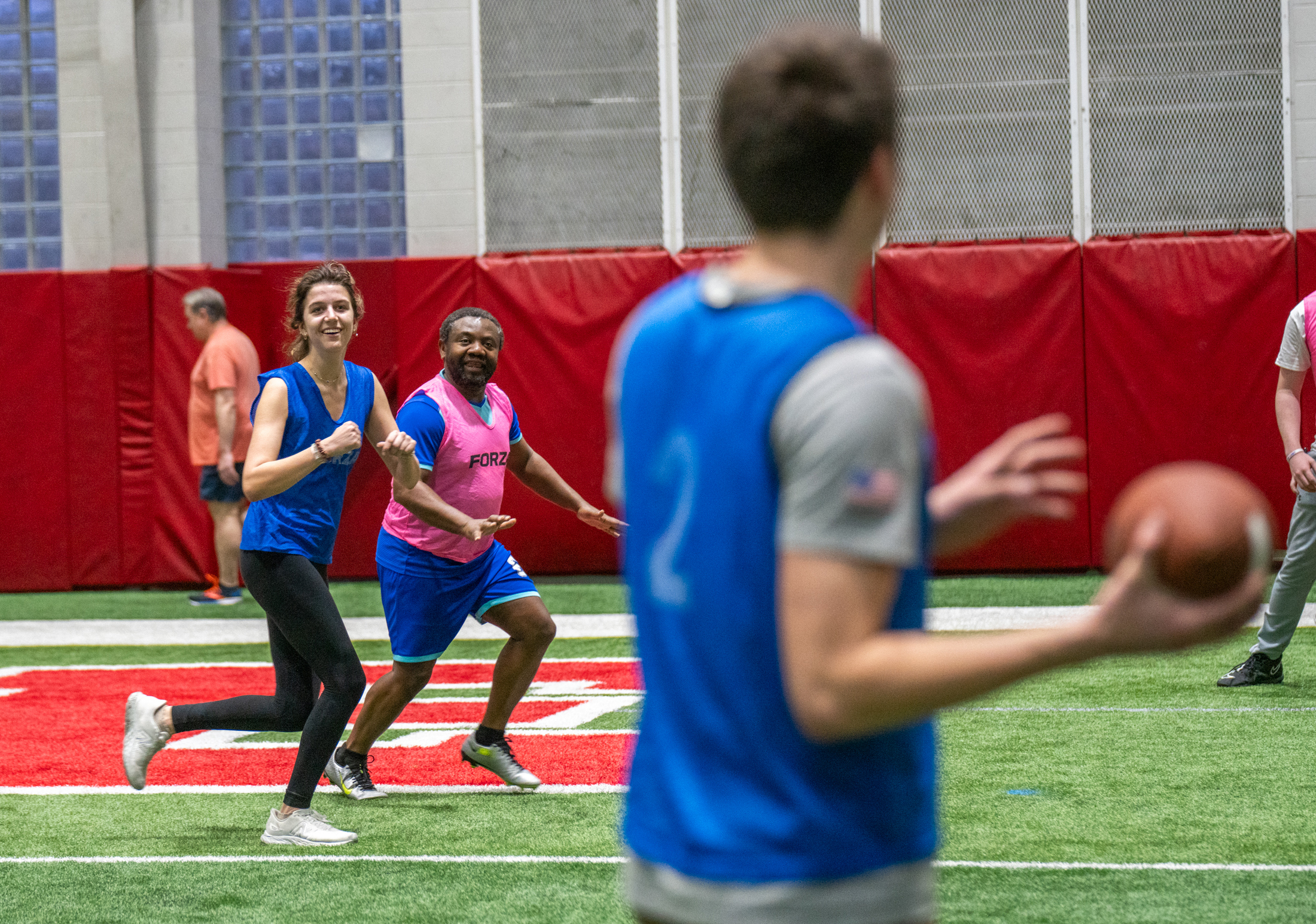
Nebraska’s Jean Marcel Ngoko Djiokap is taking physics lessons from the lectern to athletic fields to connect with students.
Through the first weeks of each semester, the associate professor of physics offers social opportunities at the Campus Recreation Center. The events are designed to help students get to know each other and show how course curriculum can be applied and enrich their appreciation of day-to-day life. By bridging the gaps between individual students and the professor and students, Ngoko aims to improve the overall learning experience.
“I want them to make friends and…be engaged, and I think meeting outside of the classroom is the key,” he said.
Ngoko started the practice in 2015 while using peer instruction for teaching a summer physics course. The condensed time frame of summer classes and the reliance on student engagement for peer instruction meant he had to find ways to motivate the students quickly. He then realized how helpful it was to form connections that can extend to the classroom.
He invites all of the students enrolled in his introductory general physics PHYS 211 lecture to attend. Around 20 students out of the nearly 120 typically attend. They have played football and soccer and will play basketball at the final event Feb. 23, although those who don’t want to play are also welcome to watch. Ngoko’s lucky, he said, because sports allow them to apply some physics concepts from the classroom to social activity.
“During my lecture I have lab demonstrations, but now when you are outside, it gives me another chance to say, ‘This is somewhere we can use exactly the range equation we learned in the class. In a 36-yard place kick in football, what speed and direction should I kick the ball so that it can go through the upright posts? And what if we were talking about a direct free kick in soccer?’” Ngoko said. “Will the shape of the ball — a prolate spheroid for football and a sphere for soccer — and the point of contact matter? How tight of a spiral — that is, how much angular momentum do I need to impart a football — so that it resists tilting?’’
Ngoko’s ultimate goal is to help students feel more comfortable with him and with each other. Many students, especially first years, find the authority associated with the position of professor intimidating, he said. Spending time together outside the classroom makes it easier for a student to come to him with a question about a lesson or give him feedback about his teaching. Other students are apprehensive about appearing foolish in front of so many unknown peers. Sometimes he can tell a student knows the answer to a question but feels too shy to raise their hand in the crowded classroom. By getting to know them, and getting them to know each other, he hopes to encourage them to speak up.
“When they notice you are an easygoing instructor, then they are not afraid,” Ngoko said.
When Delaney Knight, a freshman mechanical engineering major, recently played football with some classmates, she heard a member of the other team —the class’s instructor, Marcel — speaking to their quarterback about the parabola of his throw.
Delaney Knight, a freshman mechanical engineering major in the course, said Ngoko is funny in class and that the extra-curricular opportunities made it apparent that he cares about the students and their learning experience. She even raised her hand to ask a question in the lecture following the first game, something she cannot remember doing last semester.
“He wants us to do that because he wants us do well in his class, and he wants us to want to do well in his class,” she said. “Having a teacher you can reach out to and communicate that you don’t understand and then they break it down for you is important.”
Ngoko also regularly employs peer instruction, so bringing students together can foster the friendships necessary for that environment. Throughout the semester, friendships can turn into study groups where students can brainstorm solutions and answer each other’s questions. For students in physics or a related major, those connections can grow into people to lean on for the rest of their time on campus.
“You need some friends with whom you will study all the time, so this is the place to meet people,” Ngoko said.
Even after one social, Knight said she already recognized more people in her lecture and had talked to them at the next class. The opportunity to bond with classmates personally is valuable, she said, especially for freshmen sitting in a room with more than a hundred other people.
“Especially first semester, I had classes where I felt very alone,” Knight said. “And it was hard to do well in those classes. I didn’t have anyone to think things out with.”
Knight is an extrovert who finds it motivating to work with others, so expanding her circle is a “game changer,” she said. In addition to being a team at the social, students can build a team to share knowledge of the subject and problem solve together.
“When you put two brains together, it gets so much more done,” she said.
